最幽默的美国总统--林肯
林肯的幽默故事
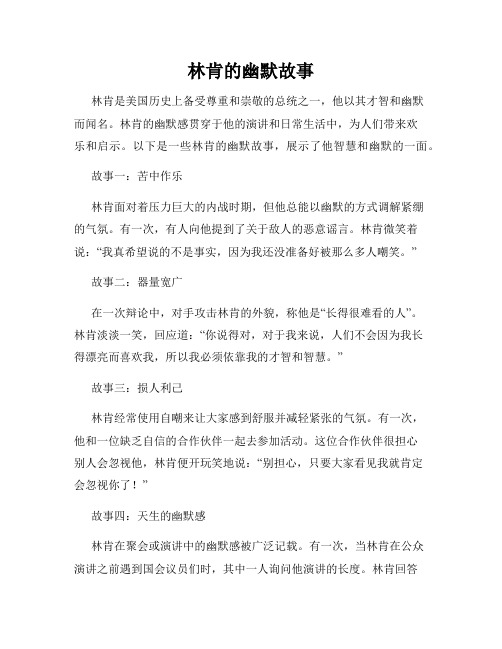
林肯的幽默故事林肯是美国历史上备受尊重和崇敬的总统之一,他以其才智和幽默而闻名。
林肯的幽默感贯穿于他的演讲和日常生活中,为人们带来欢乐和启示。
以下是一些林肯的幽默故事,展示了他智慧和幽默的一面。
故事一:苦中作乐林肯面对着压力巨大的内战时期,但他总能以幽默的方式调解紧绷的气氛。
有一次,有人向他提到了关于敌人的恶意谣言。
林肯微笑着说:“我真希望说的不是事实,因为我还没准备好被那么多人嘲笑。
”故事二:器量宽广在一次辩论中,对手攻击林肯的外貌,称他是“长得很难看的人”。
林肯淡淡一笑,回应道:“你说得对,对于我来说,人们不会因为我长得漂亮而喜欢我,所以我必须依靠我的才智和智慧。
”故事三:损人利己林肯经常使用自嘲来让大家感到舒服并减轻紧张的气氛。
有一次,他和一位缺乏自信的合作伙伴一起去参加活动。
这位合作伙伴很担心别人会忽视他,林肯便开玩笑地说:“别担心,只要大家看见我就肯定会忽视你了!”故事四:天生的幽默感林肯在聚会或演讲中的幽默感被广泛记载。
有一次,当林肯在公众演讲之前遇到国会议员们时,其中一人询问他演讲的长度。
林肯回答道:“大约两小时。
”议员惊讶地问:“你准备了吗?”林肯淡定地回答:“我几乎没有准备,因此应该花上四小时。
”故事五:草木皆兵林肯有时也会将幽默与政治相结合。
在一次辩论中,他的对手拿到一份报纸,声称刊登了一篇关于林肯的负面文章。
林肯笑着说:“我注意到他读一些文章给大家听,而我只会读一个报道,这让我觉得他比我有竞争优势。
”林肯的幽默故事展示了他天生的幽默感和智慧。
他用幽默作为一种工具,减轻紧张的气氛,调解纠纷,并鼓励人们保持积极乐观的态度。
林肯的幽默感不仅给人们带来快乐,同时也展示了他作为领导者的智慧和智慧。
正是由于这种独特的特质,林肯成为了美国历史上备受赞誉的总统之一。
林肯的自嘲

场 的 紧 张 气 氛 。 换 了 别 的 从 政 者 , 定 会 迎 头 痛 击 对 手 。但 林 一 肯就 是如 此 谦 卑 , 择 了 这样 一 选
啕 随意话
员 时 , 与 著 名 政 敌 道 格 拉斯 展 就
开 了 一 旷 日持 久 的大 辩 论 。 场 他 们俩 分别 在 7个 不 同场 合 , 美 就
出 一 条 路 。 可 是 仙 女 却 停 了下 来, 日不 转 睛地 望 着 他 , 后 开 口 最
说 ,我 终 于知 道 谁 是世 最 丑 的 “
林 肯 无奈 地 说 :大 概你 是对 “
的 , 我又有什么办法呢 ? 但 ” 仙 女 说 : 当 然 , 天 生 这 副 “ 你 丑 陋 相 貌 是 没 办 法 改 的 了 , 你 但
还 是 可 以 留 在 家 里 不 H 来 的 J
嘛 ! ”
之哗然 ,美国及许 多国家的报 纸上
出现 一 个 天怒 人 怨 的标 题 : 一位 美 “ 国将 军 说 ,纳 粹 党 人 跟 共 和 党人 与 民主 党 人 一 样 !” 谁 都 知 道 , 当 时美 国执 政 的是
种 挖 苦 自己的 方 法 , 人 倍 觉 亲 令
近。
位 功 勋 卓著 的二 战名 将 ,就
因为 一 句 随 意话 , 和平 到 来 之 际 , 在
傻瓜 说 的 总是 真 话 。没 错 , 肯 林
确 实没什么 了不起 。 ”
( 自《 摘 南方人 物周 -) 0 992 ) ? ) 0 ..2 q2
林肯 的 自嘲
名人故事林肯

名人故事林肯名人故事林肯1萨勒尤其为小阿贝费心,尽管这孩子总是一声不吭地按照她的吩咐去做。
有一次,当萨勒在做玉米饼的时候,发现阿贝正用严肃的目光瞧着她。
“我一辈子都不会忘记我最喜欢吃的.东西就是玉米饼。
”他突然说,然后就跑了出去。
阿贝似乎不像一般孩子那样容易理解,正如丹尼斯所说:“阿贝的性格有些异乎寻常。
”谁能料得到呢?也许,若不是萨勒来到这个穷乡僻壤中的小屋舍,阿贝后来就不会成为美国历史上的一个伟人。
他发育得那么快,却从来没有填饱过肚子。
而现在,能够吃饱萨勒亲手烹调的可口饭菜,他看起来健壮多了。
他的话也多起来,甚至爱笑了。
他学会了讲幽默故事,并喜欢讲给萨勒听,看她会不会在可笑的地方大笑起来。
不久,阿贝小学毕业了。
汤姆想让他留在家里做个干活的帮手,或给邻家帮工,一天可挣30美分。
他告诫阿贝,要做一个好庄稼汉,不需要知道那么多书本上的东西。
然而萨勒却坚定地站在小阿贝一边,支持他读书。
每天晨曦微露,阿贝就捧起了书本;傍晚收罢农活,他又接着学习。
如果白天去草场放牧,他就趁着马群吃草或休憩的功夫,抓紧时间看书。
有一次,他获得了一本旧法律书。
可以想见这对他来说真好比找到了金子!当天晚上,他就着火光迫不及待地读了起来,简直着了迷。
汤姆催他早点睡觉,明天好干活。
萨勒却说:“让孩子看吧。
”当阿贝读得太晚,在地板上睡着时,她就拿条毛毯来轻轻地为他盖上。
阿贝也时常练习写作。
由于缺乏纸张,他不得不常常在一块木板上画上记号,以便记住想写的内容。
一旦又搞到纸张时,他便把这些内容全部写出来。
过后,他常趁着汤姆和家里其他人都睡着的时候,守在炉边把自己所写的东西读给萨勒听。
名人故事林肯2林肯是美国的总统,他废除了黑人奴隶制,提倡人人平等的原则,是美国最伟大的'总统之一。
林肯在中学读书的时候,有一次智力测试,老师问他:“林肯,你是愿意考一道难题呢,还是考两道容易的题?”“考一道难题吧!”“好吧,那么你回答,”老师说,“蛋是怎么来的?”“鸡生的呗。
名人林肯总统的十个幽默外国小故事
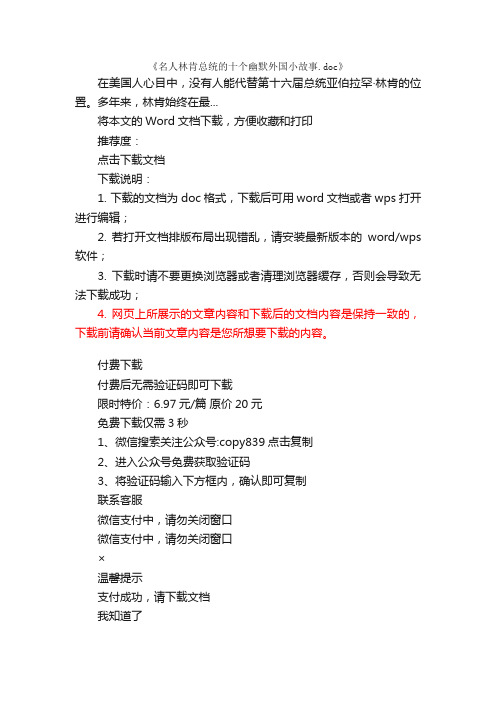
《名人林肯总统的十个幽默外国小故事.doc》在美国人心目中,没有人能代替第十六届总统亚伯拉罕·林肯的位置。
多年来,林肯始终在最...将本文的Word文档下载,方便收藏和打印推荐度:点击下载文档下载说明:1. 下载的文档为doc格式,下载后可用word文档或者wps打开进行编辑;2. 若打开文档排版布局出现错乱,请安装最新版本的word/wps 软件;3. 下载时请不要更换浏览器或者清理浏览器缓存,否则会导致无法下载成功;4. 网页上所展示的文章内容和下载后的文档内容是保持一致的,下载前请确认当前文章内容是您所想要下载的内容。
付费下载付费后无需验证码即可下载限时特价:6.97元/篇原价20元免费下载仅需3秒1、微信搜索关注公众号:copy839点击复制2、进入公众号免费获取验证码3、将验证码输入下方框内,确认即可复制联系客服微信支付中,请勿关闭窗口微信支付中,请勿关闭窗口×温馨提示支付成功,请下载文档我知道了咨询客服×常见问题•1、支付成功后,为何无法下载文档?付费后下载不了,请核对下微信账单信息,确保付费成功;已付费成功了还是下载不了,有可能是浏览器兼容性问题。
•2、付费后能否更换浏览器或者清理浏览器缓存后下载?更换浏览器或者清理浏览器缓存会导致下载不成功,请不要更换浏览器和清理浏览器缓存。
•3、如何联系客服?扫描下方二维码关注公众号“网站在线小助理”,及时联系客服解决。
请把【付款记录详情】截图给客服,同时把您购买的文章【网址】发给客服。
客服会在24小时内把文档发送给您。
(客服在线时间为周一至周五9:00-12:30 14:00-18:30)。
关于总统的名人幽默笑话_名人幽默
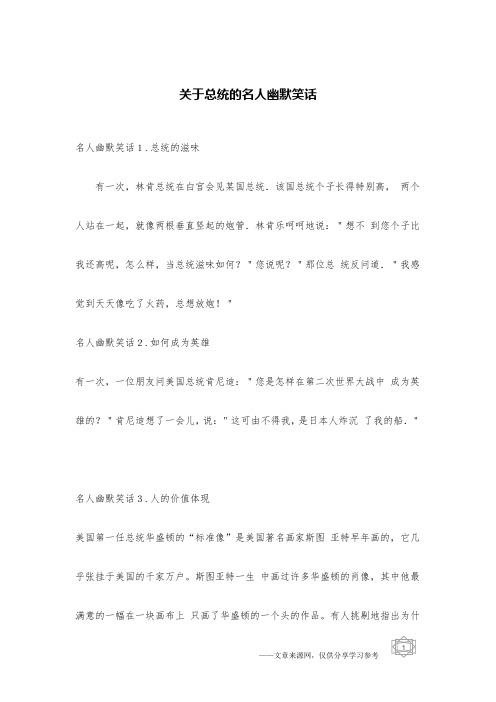
关于总统的名人幽默笑话
名人幽默笑话1.总统的滋味
有一次,林肯总统在白宫会见某国总统.该国总统个子长得特别高,两个人站在一起,就像两根垂直竖起的炮管.林肯乐呵呵地说:"想不到您个子比我还高呢,怎么样,当总统滋味如何?"您说呢?"那位总统反问道."我感觉到天天像吃了火药,总想放炮!"
名人幽默笑话2.如何成为英雄
有一次,一位朋友问美国总统肯尼迪:"您是怎样在第二次世界大战中成为英雄的?"肯尼迪想了一会儿,说:"这可由不得我,是日本人炸沉了我的船."
名人幽默笑话3.人的价值体现
美国第一任总统华盛顿的“标准像”是美国著名画家斯图亚特早年画的,它几乎张挂于美国的千家万户。
斯图亚特一生中画过许多华盛顿的肖像,其中他最满意的一幅在一块画布上只画了华盛顿的一个头的作品。
有人挑剔地指出为什
么不画全衣服,斯图亚特回答道:“人的价值不在衣着上。
”。
林肯幽默故事
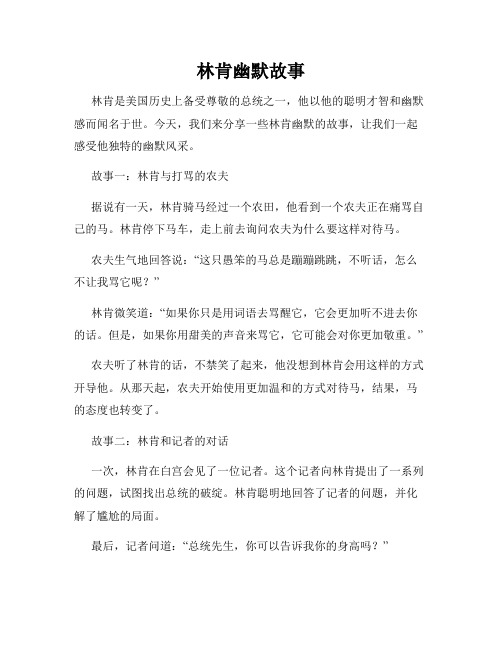
林肯幽默故事林肯是美国历史上备受尊敬的总统之一,他以他的聪明才智和幽默感而闻名于世。
今天,我们来分享一些林肯幽默的故事,让我们一起感受他独特的幽默风采。
故事一:林肯与打骂的农夫据说有一天,林肯骑马经过一个农田,他看到一个农夫正在痛骂自己的马。
林肯停下马车,走上前去询问农夫为什么要这样对待马。
农夫生气地回答说:“这只愚笨的马总是蹦蹦跳跳,不听话,怎么不让我骂它呢?”林肯微笑道:“如果你只是用词语去骂醒它,它会更加听不进去你的话。
但是,如果你用甜美的声音来骂它,它可能会对你更加敬重。
”农夫听了林肯的话,不禁笑了起来,他没想到林肯会用这样的方式开导他。
从那天起,农夫开始使用更加温和的方式对待马,结果,马的态度也转变了。
故事二:林肯和记者的对话一次,林肯在白宫会见了一位记者。
这个记者向林肯提出了一系列的问题,试图找出总统的破绽。
林肯聪明地回答了记者的问题,并化解了尴尬的局面。
最后,记者问道:“总统先生,你可以告诉我你的身高吗?”林肯笑着回答:“我已经告诉了你我的其他优点,你还想知道我的身高吗?好吧,我告诉你吧,我“项目人民党的总统候选人,身高6英尺4英寸。
”记者感到很尴尬,他并没有意识到林肯是在开玩笑。
林肯幽默的个性使他能够处理各种棘手的情况,他用他独特的幽默感化解了许多尴尬的场面。
故事三:林肯的自嘲林肯不仅善于使用幽默来应对他人,而且他也非常擅长运用自嘲的幽默来轻松自如地处理自己的缺点。
有一次,一位政治家嘲笑林肯的外貌,他说:“林肯先生,你的脸真是丑陋不堪。
”林肯立刻回答:“我知道,我有一个与我一样丑的照片挂在博物馆里。
”他的幽默不仅使他在嘲笑的场合保持了自信,还为他赢得了更多人们的尊重和喜爱。
通过这些幽默故事,我们可以看到林肯拥有独特的幽默感和智慧。
他善于运用幽默来化解尴尬的局面,同时也能自嘲,使他更加接地气。
正是这种幽默感和智慧让林肯成为了历史上备受敬重的伟大总统之一。
结束语:林肯幽默故事让我们感受到了这位伟大总统的聪明才智和幽默感。
【名人故事】领袖用幽默塑造智慧
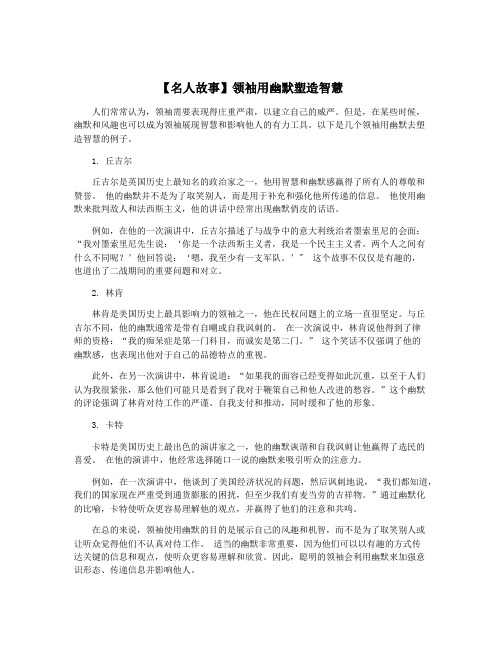
【名人故事】领袖用幽默塑造智慧人们常常认为,领袖需要表现得庄重严肃,以建立自己的威严。
但是,在某些时候,幽默和风趣也可以成为领袖展现智慧和影响他人的有力工具。
以下是几个领袖用幽默去塑造智慧的例子。
1. 丘吉尔丘吉尔是英国历史上最知名的政治家之一,他用智慧和幽默感赢得了所有人的尊敬和赞誉。
他的幽默并不是为了取笑别人,而是用于补充和强化他所传递的信息。
他使用幽默来批判敌人和法西斯主义,他的讲话中经常出现幽默俏皮的话语。
例如,在他的一次演讲中,丘吉尔描述了与战争中的意大利统治者墨索里尼的会面:“我对墨索里尼先生说:‘你是一个法西斯主义者,我是一个民主主义者。
两个人之间有什么不同呢?’他回答说:‘嗯,我至少有一支军队。
’" 这个故事不仅仅是有趣的,也道出了二战期间的重要问题和对立。
2. 林肯林肯是美国历史上最具影响力的领袖之一,他在民权问题上的立场一直很坚定。
与丘吉尔不同,他的幽默通常是带有自嘲或自我讽刺的。
在一次演说中,林肯说他得到了律师的资格:“我的痴呆症是第一门科目,而诚实是第二门。
”这个笑话不仅强调了他的幽默感,也表现出他对于自己的品德特点的重视。
此外,在另一次演讲中,林肯说道:“如果我的面容已经变得如此沉重,以至于人们认为我很紧张,那么他们可能只是看到了我对于鞭策自己和他人改进的愁容。
”这个幽默的评论强调了林肯对待工作的严谨、自我支付和推动,同时缓和了他的形象。
3. 卡特卡特是美国历史上最出色的演讲家之一,他的幽默诙谐和自我讽刺让他赢得了选民的喜爱。
在他的演讲中,他经常选择随口一说的幽默来吸引听众的注意力。
例如,在一次演讲中,他谈到了美国经济状况的问题,然后讽刺地说,“我们都知道,我们的国家现在严重受到通货膨胀的困扰,但至少我们有麦当劳的吉祥物。
”通过幽默化的比喻,卡特使听众更容易理解他的观点,并赢得了他们的注意和共鸣。
在总的来说,领袖使用幽默的目的是展示自己的风趣和机智,而不是为了取笑别人或让听众觉得他们不认真对待工作。
林肯非凡口才的故事_演讲与口才_
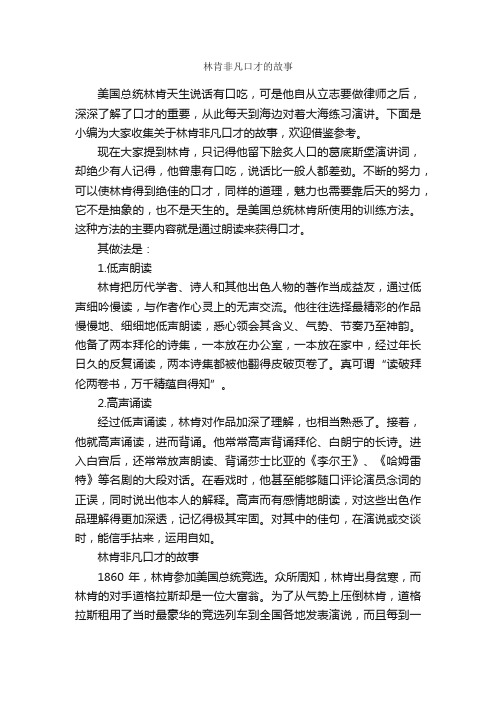
林肯非凡口才的故事美国总统林肯天生说话有口吃,可是他自从立志要做律师之后,深深了解了口才的重要,从此每天到海边对着大海练习演讲。
下面是小编为大家收集关于林肯非凡口才的故事,欢迎借鉴参考。
现在大家提到林肯,只记得他留下脍炙人口的葛底斯堡演讲词,却绝少有人记得,他曾患有口吃,说话比一般人都差劲。
不断的努力,可以使林肯得到绝佳的口才,同样的道理,魅力也需要靠后天的努力,它不是抽象的,也不是天生的。
是美国总统林肯所使用的训练方法。
这种方法的主要内容就是通过朗读来获得口才。
其做法是:1.低声朗读林肯把历代学者、诗人和其他出色人物的著作当成益友,通过低声细吟慢读,与作者作心灵上的无声交流。
他往往选择最精彩的作品慢慢地、细细地低声朗读,悉心领会其含义、气势、节奏乃至神韵。
他备了两本拜伦的诗集,一本放在办公室,一本放在家中,经过年长日久的反复诵读,两本诗集都被他翻得皮破页卷了。
真可谓“读破拜伦两卷书,万千精蕴自得知”。
2.高声诵读经过低声诵读,林肯对作品加深了理解,也相当熟悉了。
接着,他就高声诵读,进而背诵。
他常常高声背诵拜伦、白朗宁的长诗。
进入白宫后,还常常放声朗读、背诵莎士比亚的《李尔王》、《哈姆雷特》等名剧的大段对话。
在看戏时,他甚至能够随口评论演员念词的正误,同时说出他本人的解释。
高声而有感情地朗读,对这些出色作品理解得更加深透,记忆得极其牢固。
对其中的佳句,在演说或交谈时,能信手拈来,运用自如。
林肯非凡口才的故事1860 年,林肯参加美国总统竞选。
众所周知,林肯出身贫寒,而林肯的对手道格拉斯却是一位大富翁。
为了从气势上压倒林肯,道格拉斯租用了当时最豪华的竞选列车到全国各地发表演说,而且每到一站都要奏乐鸣炮,场面相当壮观。
道格拉斯得意洋洋地宣称:“我要让林肯这个乡巴佬闻闻我的贵族气味儿。
” 相反,林肯没有专车,他买票乘车,每到一站,朋友们为他准备一辆耕田用的马拉车。
但林肯丝毫没有自惭形秽,他发表竞选演说时说:“有人写信问我有多少财产,我有一位妻子和三个儿子,都是无价之宝。
林肯-最幽默的美国总统

林肯-最幽默的美国总统林肯是美国历任总统中最具幽默感的一位。
早在读书时,有一次考试,老师问他:“你愿意答一道难题,还是两道容易的题目?”林肯很有把握地答:“答一道难题吧。
”“那你回答,鸡蛋是怎么来的?”“鸡生的。
”老师又问:“那鸡又是从哪里来的呢?”“老师,这已经是第二道题了。
”林肯微笑着说。
一次,林肯步行到城里去。
一辆汽车从他身后开来时,他扬手让车停下来,对司机说:“能不能替我把这件大衣捎到城里去?”“当然可以,”司机说,“可我怎样将大衣交还给你呢?”林肯回答说:“哦,这很简单,我打算裹在大衣里头。
”司机被他的幽默所折服,笑着让他上了车。
林肯当过律师。
有一次出庭,对方律师把一个简单的论据翻来覆去地陈述了两个多小时,讲得听众都不耐烦了。
好不容易才轮到林肯上台替被告辩护,他走上讲台,先把外衣脱下放在桌上,然后拿起玻璃杯喝了两口水,接着重新穿上外衣,然后再脱下外衣放在桌上,又再喝水,再穿衣,这样反反复复了五六次,法庭上的听众笑得前俯后仰。
林肯一言不发,在笑声过后才开始他的辩护演说。
林肯的脸较长,不好看。
一次,他和斯蒂芬·道格拉斯辩论,道格拉斯讥讽他是两面派。
林肯答道:“要是我有另一副面孔的话,我还会戴这副难看的面孔吗?” 有一次,林肯在擦自己的皮鞋,一个外国外交官向他走来说:“总统先生,您竟擦自己的皮鞋?”“是的,”林肯诧异地反问,“难道你擦别人的皮鞋?” 有人认为林肯对待政敌的态度不够强硬,对他说:“你为什么要让他们成为朋友呢?你应该想办法消灭他们才对。
”“我难道不是在消灭政敌吗?当我使他们成为我的朋友时,政敌就不存在了。
”林肯温和地说。
又有一次,一个妇人来找林肯,她理直气壮地说:“总统先生,你一定要给我儿子一个上校的职位。
我们应该有这样的权利,因为我的祖父曾参加过雷新顿战役,我的叔父在布拉敦斯堡是惟一没有逃跑的人,而我的父亲又参加过纳奥林斯之战,我丈夫是在曼特莱战死的,所以……”林肯回答说:“夫人,你们一家三代为国服务,对国家的贡献实在够多了,我深表敬意。
美国总统公关趣闻

美国总统公关趣闻高兴宇以理专家研究说:一个人能否获得成功,20%靠智商,80%靠情商。
如何认识自己和他人以及如何去适应社会?如何处理好林林总总的公共关系?美国历任的众多总统靠他们丰富的情商,演绎出他们在社会公关交往中一件件趣闻轶事,使世人津津乐道。
气度恢弘谦卑待人中国古话说:将军额头可跑马,宰相肚里能撑船。
作为美国的总统,当然应当具备这样恢弘气度。
这样,才能减少摩擦,化解冲突,建立自己崇高威信。
林肯和儿子乘马车上街,街口被路过的军队堵塞了,林肯问路边的一个人:“这是什么?”意思是哪个部队,但那个人误解了,以为他不认识军队,便说:“联邦军队呗,你真是个大笨蛋。
”林肯诚恳地说声:“谢谢。
”过后,林肯对儿子说:“他说我是大笨蛋,对我们来说,这是一种幸福。
”路易斯是罗斯福的助手,他巧舌如簧,精于谋略,善于运筹。
对此,对于罗斯福很欣赏。
但路易斯的另一面是古板、固执、粗俗,甚至经济性的恶语顶撞,对此,罗斯福则糊涂置之,甚至视而不见。
福特当总统时,许多记者群起攻之,说他憨,说他臀部大,而福特呢?不惜韬光养晦,“自己作贱自己”。
面对攻讦,他尽可能地嘲笑自己。
这些美国总统“忍心吞声”的处世策略有极大的妙处,它不仅防止了矛盾的扩大,而且还有可能“化敌为友”。
和善可亲有情有礼友善、亲切、礼貌、教养是一些财富,它像阳光一样受到人们的欢迎。
杰佛逊和他的孙子一起骑马外出。
路上,有一个奴隶向他们脱帽鞠躬,总统也摘帽还礼。
但他的孙子不理睬这黑人。
“汤姆生!”档佛逊说:“你怎么能够让一个奴隶都比你文明得多呢?”林肯在职期间每月都要接见民众一次,倾听他们的要求和反映。
在白宫前边两人一排的民众队伍达半英里。
由于和人们握手太多,每次接见以后,林肯的胳膊总要麻木整整一个夜晚。
医生劝他暂停这种活动,但林肯说:“我来自人民,必须经常洗人民的澡。
”罗斯福在白宫举行的招待会上,曾和8513位人士握手,创造了一次握手的世界最高纪录。
里根在遇刺后,对妻子南希说:“亲爱的,我当时忘了像鸭子一样突然扎入水中。
林肯的故事作文800字

林肯的故事作文800字林肯的故事作文800字林肯的伟大一生书写了一个伟大的真理除非你放弃,否则你就不会失败。
下面是小编收集关于林肯的故事,欢迎阅读。
第一篇:林肯的故事我心目中的林肯是永远不会被困难吓倒、宽容大度,谦虚诚恳,勤劳简朴,机智聪明和仁义正义的人。
他的这种人格魅力,高尚品质深深地感动了所有人,使他们对其认定。
林肯的一生充满了挫折,但是他从来没有放弃,而是坚强地,不顾一切地,艰辛地去度过一个又一个的难关,一步一个脚印地不断完善自己。
他22岁逐角议员失败;23岁经商失败;26岁经商再次失败;27岁第二次逐角议员再度失败;30爱人去世;32岁精神崩溃;34岁第三次逐角议员又是失败;40岁逐角美国副总统失败;45岁第四次逐角议员,仍然失败了。
经过百般努力,林肯在他52岁那年终于当上了美国总统。
在历尽沧桑和饱受无情打击的时候,林肯可以百折不回。
他在竞选的时候,曾经失败六次,但是每次竞选失败之后,林肯都会激励自己:“这不过是滑了一跤而已,并不是死了怕不起来了。
”他就是用这些词,这句话来克服困难的。
在当选美国总统的时候,他又遭到参议员们的羞辱和嘲笑,因为他出生卑微,所以他只是依靠自己出类拔萃的才华与高尚品质来感化这些轻蔑他的人。
正是他的这些优势,使他赢得了那位傲慢的参议员的尊重,抵达了生命的辉煌,当选上了美国第16任总统。
每个人的人生道路总是有许多坎坷的,不会一路顺风。
我们无论是在学习上,还是在生活上,遇到困难要像林肯那样,不畏艰险永不停止地前进,这样,最后的胜利才属于我们。
我在这篇文章中,学到了林肯坚强的精神,他不会被困难吓倒、宽容大度,谦虚诚恳,和仁义正义。
有“卓越的演讲家”之誉。
他领导了对南方奴隶制度的战争,颁发了《解放黑人奴隶的宣言》,维护了美利坚合众国的统一,为美国在19世纪跃居世界头号工业强国开辟了道路,使美国进入经济发展的时代,被称为“伟大的解放者”。
林肯会得这些荣誉,是因为他坚强,我们也要学习他这种精神!第二篇:林肯的故事学了《鞋匠的儿子》这一课,让我们深刻的到,林肯的仁爱正义,与宽容大度。
美国总统的幽默逸事_名人故事

美国总统的幽默逸事在美国历史上曾诞生了许多有影响力的总统,他们的机智幽默在他们的政治生涯中体现得淋漓尽致,被全世界人们广为传诵。
无忧的总统杰米·;卡特是美国的第39任总统。
卡特在南方时曾虔诚地接受过基督教的洗礼。
由于这段经历,记者们常喜欢让他就道德问题发表看法,其中不乏一些不太礼貌的难题。
有一次,有个记者问卡特:“如果有人告诉你:你的女儿与别人有不正当的恋爱关系,你将作何感想?”卡特回答说:“我会大吃一惊,不知所措。
”稍作中断后他又加上一句:“不过现在还不用操心,她刚刚7岁。
”钱和雨在卡特的飞机降临在饱受旱灾之苦的得克萨斯某镇之前,该镇忽然下起了雨。
卡特踏上滑溜溜的机场跑道,向聚集在那里前来欢迎他的农民发出微笑。
“你们或者要钱或者要雨,”他说;“我拿不出钱,所以我只好带好了雨。
”一语双关杰拉尔德·;R·;福特是美国第38任总统,他说话喜欢用双关语。
有一次,他回答记者提问时说:“我是一辆福特,不是林肯。
众所周知,林肯既是美国很伟大的总统,又是一种最高级的名牌小汽车;福特则是当时普通、廉价而大众化的汽车。
福特说这句话,一是表示谦虚,一是为了标榜自己是大众喜欢的总统。
从未用过的心脏美国第36届总统林登·;贝恩斯·;约翰逊嘲笑共和党政敌时说道:“有一位老人需要做心脏移植手术。
有三颗心脏可供选择,一颗是18岁运动员的,第二颗是19岁舞蹈家的。
第三颗是75岁银行家的。
这位病人询问银行家的政见,得知他是一位共和党人。
了解这一点后,这位病人选择了银行家的心脏。
“移植手术相当成功。
人们问他为什么宁愿选择75岁老人的心脏,而不要充满生气的年轻人心脏,他说:&lsquo:我需要一颗我知道从未用过的心脏&rsquo:。
”需要大量资金约翰逊总统向一群商业界头面人物讲了一则轶事,以说明需要大量资金同俄国人导弹竞赛。
林肯的幽默小故事
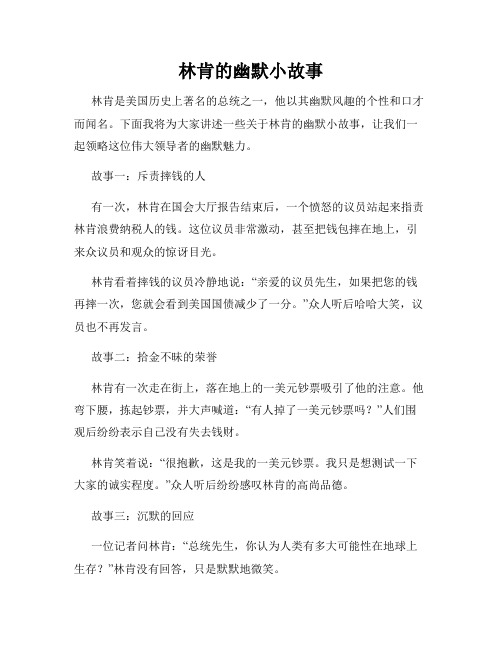
林肯的幽默小故事林肯是美国历史上著名的总统之一,他以其幽默风趣的个性和口才而闻名。
下面我将为大家讲述一些关于林肯的幽默小故事,让我们一起领略这位伟大领导者的幽默魅力。
故事一:斥责摔钱的人有一次,林肯在国会大厅报告结束后,一个愤怒的议员站起来指责林肯浪费纳税人的钱。
这位议员非常激动,甚至把钱包摔在地上,引来众议员和观众的惊讶目光。
林肯看着摔钱的议员冷静地说:“亲爱的议员先生,如果把您的钱再摔一次,您就会看到美国国债减少了一分。
”众人听后哈哈大笑,议员也不再发言。
故事二:拾金不昧的荣誉林肯有一次走在街上,落在地上的一美元钞票吸引了他的注意。
他弯下腰,拣起钞票,并大声喊道:“有人掉了一美元钞票吗?”人们围观后纷纷表示自己没有失去钱财。
林肯笑着说:“很抱歉,这是我的一美元钞票。
我只是想测试一下大家的诚实程度。
”众人听后纷纷感叹林肯的高尚品德。
故事三:沉默的回应一位记者问林肯:“总统先生,你认为人类有多大可能性在地球上生存?”林肯没有回答,只是默默地微笑。
记者对此感到困惑,又追问了一遍同样的问题。
林肯仍然保持沉默。
最后,林肯解释道:“尊敬的记者先生,我相信如果我们保持沉默,人类在地球上生存的机会就会更大。
”这个简短的对话展示了林肯的智慧和幽默,同时也让我们思考沉默的力量。
故事四:林肯的狗有一天,总统府的门房看见林肯在院子里和一只狗嬉戏。
门房纳闷地问林肯:“总统先生,你为什么和狗玩得这么开心?”林肯答道:“因为他是唯一一个没有相同政见的人。
”这个小故事揭示了林肯待人宽容和谦虚的品质,他不把自己看作是权力的象征,而是以一种平等和友善的态度对待每一个人。
总结:林肯的幽默小故事展示了他机智、幽默的一面,并且从中我们也可以看到他对待困境的乐观态度。
这些小故事不仅让我们感受到了他的个人魅力,也为我们树立了一个正面的榜样。
无论是在政治舞台上还是在生活中,林肯的幽默都是他的一项独特才能,也是他成功的关键之一。
他的幽默能够化解尴尬、缓和紧张气氛,赢得他人的尊重和支持。
林肯总统的幽默故事

Abraham Lincoln Stories and Humor林肯总统的幽默故事The Gilder Lehrman Collection, New YorkWhen Ohio Congressman James Ashley disapproved of a story Abraham Lincoln had just told, the President responded: 揂shley, I have great confidence in you and great respect for you, and I know how sincere you are. But if I couldn抰tell these stories, I would die.? On another occasion the President prefaced a discussion of the draft Emancipation Proclamation by reading aloud from a favorite humorist. In response to the disapproval of some members of his cabinet, Mr. Lincoln said: 揋entlemen, why don抰you laugh? With the fearful strain that is upon me night and day, if I did not laugh I should die, and you need this medicine as much as I do.?1The Civil War presented a dark background for Mr. Lincoln抯stories. Ohio journalist David R. Locke, himself one of Mr. Lincoln抯favorite humorists, recalled: 揌is flow of humor was a sparkling spring gushing out of a rock ?the flashing water had a somber background which made it all the brighter. Whenever merriment came over that wonderful countenance it was like a gleam of sunshine upon a cloud ?it illuminated, but did not dissipate.?2 An Indiana Congressman, George W. Julian, recalled that President Lincoln 揺ntered into the enjoyment of his stories with all his heart, and completely lived over again the delight he had experienced in telling them on previous occasions. When he told a particularly good story, and the time came to laugh, he would sometimes throw his left foot across his right knee, and clenching his foot with both hands and bending forward, his whole frame seemed to be convulsed with the effort to give expression to his sensations...I believe his anecdotes were his great solace and safeguard in seasons of severe mental depression.?3Historian Allen C. Guelzo wrote: 揌e knew that the jokes and stories put people off, and he also grew aware over time that he was acquiring a public reputation as a jokester. But he needed 憈hese stories ?jokes?jests?as the 憈he vents of my moods and gloom? and he assured onlookers that his 憁oods and gloom?were matters of temperament, not signs ofdespair. 慪ou flaxen men with broad faces are born with cheer, and don抰know a cloud from a star,?Lincoln explained to the anti-slavery congressman Josiah Grinnell. 慖am of another temperament.挃4Stories and humor were nearly as important to Lincoln as oxygen and water. They were part of his life blood. Humor helped offset his natural sadness. It was literally an escape from the internal and external pressures and events of his life. Journalist Henry Villard noted that Lincoln could find a story 搕o explain a meaning or enforce a point, the aptness of which was always perfect.?5 Treasury Secretary Hugh McCullough wrote:揟he habit of story-telling...became part of his nature, and he gave free rein to it, even when the fate of the nation seemed to be trembling in the balance. Some eight or ten days after the first battle of Bull Run, when Washington was utterly demoralized by its result, I called upon him at the White House, in company with a few friends, and was amazed when, referring to something which had been said by one of the company about the battle which was so disastrous to the Union forces, he remarked, in his usual quiet manner, 慣hat reminds me of a story,?which he told in a manner so humorous as to indicate that he was free from care and apprehension. This to me was surprising. I could not then understand how the President could feel like telling a story when Washington was in danger of being captured, and the whole North was dismayed; and I left the White House with the feeling that I had been mistaken in Mr. Lincoln抯character, and that his election might prove to have been a fatal mistake. This feeling was changed from day to day as the war went on; but it was not entirely overcome until I went to Washington in the spring of 1863, and as an officer of the government was permitted to have free intercourse with him. I then perceived that my estimate of him before his election was well grounded, and that he possessed even higher qualities than I had given him credit for; that he was a man of sound judgment, great singleness and tenacity of purpose, and extraordinary sagacity; that story-telling was to him a safety-valve, and that he indulged in it, not only for the pleasure it afforded him, but for a temporary relief from oppressing cares; that the habit had been so cultivated that he could make a story illustrate a sentiment and give point to an argument.?6According to McCulloch, 揝tory-telling with him was something more than a habit. He was so accustomed to it in social life and in the practice of his profession that it became a part of his nature, and so accurate was his recollection, and so great a fund had he at command, that he had always anecdotes and stories to illustrate his arguments and delight those whose tastes were similar to his own; but those who judged from this trait that he had lacked deep feeling, or sound judgment, or a proper sense of the responsibility of his position, had no just appreciation of his character. He possessed all these qualities in an eminent degree.?7As President, Mr. Lincoln had a new forum for stories he had been telling and retelling for years. Keith W. Jennison wrote in The Humorous Mr. Lincoln: 揗r. Lincoln抯use of humor changed. During the wilderness years he told jokes and stories without trying to prove anything at all; he told them simply because it was natural for him to do so. After he became a lawyer he found that his wit and his acute sense of the ridiculous were effective courtroom tools. As a politician he handed the weapon of satire as a stiletto or a broadax as the occasion demanded. During the first few months of his Presidency he used humor many times as a roundabout way of saying 憂o.? As his responsibility grew and became almost unendurable he took to telling jokes again, trying to lessen the tensions in himself and those around him.?8Jokes were a weapon in a different war. Stories were an evasive tactic for Mr. Lincoln in dealing with people or topics he preferred to avoid. Henry Clay Whitney related about aself-important individual who called on President Lincoln to give him unsolicited advice. 揂s soon as he broached his subject, Lincoln interrupted him by the most silly, grotesque and inapplicable anecdote ?as far away from the subject of conversation as possible. The visitor was shocked and indignant; he had thoroughly matured a plan to expedite the return of peace and save thousands of human lives, as well as the nation, and had traveled a thousand miles at his own expense to impart it to the President and to make it personally certain that it would be adopted; and then, in that solemn crisis of the nation抯fate, to behold the President assume the role of a clown and turn grotesque somersaults; why, it was worse than Nerofiddling at the conflagration of Rome! The result was that he retired, utterly astounded and discomfited, from the presence of the jester who sat in the presidential chair, and went to one of the secretaries, who was a neighbor, and narrated the incident. But instead of receiving condolence, his neighbor burst into a long and boisterous fit of merriment. The astonished and discomfited patriot exclaimed: 慛ow, you say that Lincoln抯stories always have some object or moral; please tell me what object or moral such an absurd, irrelevant, clownish story could possibly have?? 慦hat object??exclaimed the cabinet minister. 慣he most necessary object in the world at that time: to get rid of you and get to his business, and, according to your own story, he did it.?/i>9Poet Walt Whitman wrote: 揂s is well known, story-telling was often with President Lincoln a weapon which he employ抎with great skill. Very often he could not give a point-blank reply or comment梐nd these indirections, (sometimes funny, but not always so,) were probably the best responses possible. In the gloomiest period of the war, he had a call from a large delegation of bank presidents. In the talk after business was settled, one of the big Dons asked Mr. Lincoln if his confidence in the permanency of the Union was not beginning to be shaken 梬hereupon the homely President told a little story: 揥hen I was a young man in Illinois,?said he, 揑boarded for a time with a deacon of the Presbyterian church. One night I was roused from my sleep by a rap at the door, and I heard the deacon抯voice exclaiming, 慉rise, Abraham! the day of judgment has come!?I sprang from my bed and rushed to the window, and saw the stars falling in great showers; but looking back of them in the heavens I saw the grand old constellations, with which I was so well acquainted, fixed and true in their places. Gentlemen, the world did not come to an end then, nor will the Union now.?10President Lincoln also used stories to change the mood of those around him. British journalist William Howard Russell wrote after attending a White House state dinner in 1861 that he 搘as amused to observe the manner in which Mr. Lincoln used the anecdotes for which he is famous. Where men bred in courts, accustomed to the world, or versed in diplomacy would use some subterfuge, or would make a polite speech, or give a shrug of the shoulders as the means of getting out of an embarrassing position, Mr. Lincoln raises a laugh by some boldwest-country anecdote, and moves off in the cloud of merriment produced by this joke.?11Longtime friend Joshua Speed recalled being present when a delegation of midwestern leaders called upon President Lincoln: 揟he committee was composed of able and distinguished men. Senator Lane opened for Indiana, Garrett Davis followed for Kentucky, and other gentlemen for Ohio and Illinois. They all had complaints to make of the conduct of the war in the West. Like the expression in the prayer-book, the Government was doing every thing it ought not to do, and leaving undone every thing it ought to do. The President sat on a revolving chair, looking at every one till they were all done. I never saw him exhibit more tact or talent than he did on this occasion. He said, 慛ow, gentlemen, I am going to make you a curious kind of speech. I announce to you that I am not going to do one single thing that any one of you have asked me to do. But it is due to myself and to you that I should give my reasons.? He then, from his seat, answered each man, taking them in the order in which they spoke, never forgetting a point that any one had made. When he was done, he rose from his chair and said, 慗udge List, this reminds me of an anecdote which I heard a son of yours tell in Burlington, Iowa. He was trying to enforce upon his hearers the truth of the old adage that 憈hree removes are worse than a fire.? As an illustration, he gave an account of a family who started from Western Pennsylvania, pretty well off in this world抯goods when they started. But they moved and moved, having less and less every time they moved, till after a while they could carry everything in one wagon. He said that the chickens of the family got so used to being moved, that whenever they saw the wagon sheets brought they laid themselves on their backs and crossed their legs, ready to be tied. Now, gentlemen, if I were to be guided by every committee that comes in at that door, I might just as well cross my hands and let you tie me. Nevertheless, I am glad to see you.挃12Mr. Lincoln never claimed to originate his stories. Henry C. Whitney recalled that Judge Samuel 揟reat told me that he once lent Lincoln a copy of 慗oe Miller,?and Lincoln kept it for a while and evidently learned its entire contents, for he found Lincoln narrating the stories contained therein around the circuit, but very much embellished and changed, evidently by Lincoln himself.?13 Such stories were internalized and Lincolnized to fit the occasion.揕incolnalways insisted he was a 憆etailer,?not a 憌holesaler,?of the stories that made him famous. "I don't make the stories mine by telling them," he modestly maintained. But such confessions did not stop publishers from issuing books like Old Abe's Jokester and The Humors of Old Abe while he was serving in the White House. Lincoln thus became the first president ever to inspire a joke book poetic justice for a man who listed at least one joke collection among the favorite books of his youth,?wrote Harold Holzer in Civil War Times. 揕incoln's jesting ultimately did him as much harm as good. Writers twitted him with volumes like Abraham Africanus I, a raw satire accusing him of radical policies on race and tyrannical practices such as arbitrary arrests." 14Mr. Lincoln抯stories often fell into predictable categories ?rural family life, rural travel, the Bible and clergy, the courtroom, generals and soldier life. Journalist Noah Brooks wrote: 揝cripture stories and incidents were also used by Lincoln to illustrate his argument or to enforce a point. Judge E---- had been concerned in a certain secret organization of 憆adical?Republicans, whose design was to defeat Lincoln抯renomination. When this futile opposition had died out, the judge was pressed by his friends for a profitable office. Lincoln appointed him, and to one who remonstrated against such a display of magnanimity, he replied, 慦ell, I supposed Judge E----, having been disappointed before, did behave pretty ugly; but that wouldn抰make him any less fit for this place; and I have scriptural authority for appointing him. You remember that when the Lord was on Mount Sinai getting out a commission for Aaron, that same Aaron was at the foot of the mountain making a false god for the people to worship. Yet Aaron got his commission, you know.?15Biographer Benjamin Thomas wrote: 揕incoln抯return to the 慻rass roots?for the gems of his wit is not without significance. For a sense of humor connotes an intimate acquaintance with human nature and life, a sense of proportion, and thus of disproportion, a realization of the petty conceits, the affectations, the foibles and weaknesses of men. It implies, in other words, the possession of the qualities of 慼orse sense?and discernment. And Lincoln抯preference for the humor of the common people, evincing a recognition of the fact that they possessed these qualities, was an attestation of his confidence in the fundamental soundness of theirjudgment.?16Mr. Lincoln was from the beginning of his circuit-riding the light and life of the court,?wrote friend Ward Hill Lamon. 揟he most trivial circumstance furnished a back-ground for his wit. The following incident, which illustrates his love of a joke, occurred in the early days of our acquaintance. I, being at the time on the infant side of twenty-one, took particularly pleasure in athletic sports. One day when we were attending the circuit court which met at Bloomington, Ill.,I was wrestling near the court house with some one who had challenged me to a trial, and in the scuffle made a large rent in the rear of my trousers. Before I had time to make any change, I was called into court to take up a case. The evidence was finished. I, being the Prosecuting Attorney at the time, got up to address the jury. Having on a somewhat short coat, my misfortune was rather apparent. One of the lawyers, for a joke, started a subscription paper which was passed from one member of the bar to another as they sat by a long table fronting the bench, to buy a pair of pantaloons for Lamon,--'he being,' the paper said, 'a poor but worthy young man.' Several put down their names with some ludicrous subscription, and finally the paper was laid by some one in front of Mr. Lincoln, he being engaged in writing at the time. He quietly glanced over the paper, and, immediately taking up his pen, wrote after his name, 'I can contribute nothing to the end in view.'?17Mr. Lincoln practiced his humorous repertoire in his semi-annual trips around the Eighth Judicial Circuit. Lincoln scholar F. Lauriston Bullard wrote: 揕ife on the circuit was so ordered that storytelling tournaments were practically ordained for the nights and week ends, as the trial of cases was the order for the intervening days. Into the little country seats the judge and the members of the bar came riding, and in the crowded taverns, with witnesses and local jurymen about them, all hands swapped stories. That Lincoln enjoyed the eminence accorded him as the best spinner of yarns in the state is undeniable. These stories he brought with him to Washington in 1861.?18Springfield attorney Milton Hay maintained that 揕incoln heard his stories; jokes &c., and never forgot them and that the secret of L抯success in this line was in the active ?personifiedtelling of them (Lincoln always told his stories &c, acting a part of them in looks ?jestures ?acts &c[.]? William H. Herndon added that 揕incoln & his story were in harmony ?were one & identical.?19 Friend Henry C. Whitney recalled: 揑n our walks about the little towns where courts were held, he saw ludicrous elements in everything, and could either narrate some story from his storehouse of jokes, else he could improvise one; he saw the ludicrous in an assemblage of fowls, in a man spading his garden, in a clothes-line full of clothes, in a group of boys, in a lot of pigs rooting at a mill door, in a mother duck learning her brood to swim; in anything and everything Lincoln saw some ludicrous incident.?20Mr. Lincoln抯incredible memory was central to his story-telling success. One Lincoln client, Herring Chrisman, testified to Mr. Lincoln抯abilities when the Springfield lawyer visited Chicago and exchanged stories one night with another lawyer, Murray McConnell: 換uite a little audience dropped in and they felt inspired to begin. McConnell was a good story-teller, but his repertoire was not unlimited, and Lincoln was familiar with his whole stock in trade, whereas Lincoln could both make and tell stories and nobody could ever anticipate him. On that occasion he acted as master of ceremonies and would call for such a story by name as he wanted McConnell to tell, and after laughing at it as heartily as anybody else, he would without request tell one of his own. He never laughed once at his own story, but would give a slight chuckle to start the laugh and then sober up. The fun ran fast and furious till bedtime, and I don 抰think any of the company ever before laughed as much.?21Partner William H. Herndon recalled: 揑n the role of a story-teller I regard Mr. Lincoln as without an equal. His power of mimicry and his manner of recital were unique. His countenance and all his features seemed to take part in the performance. As he neared the pith or point of the story every vestige of seriousness disappeared from his face. His gray eyes sparkled; a smile seemed to gather up, curtain-like, the corners of his mouth; his frame quivered with suppressed excitement; and when the nub of the story ?as he called it ?came, no one抯laugh was heartier than his.?22Lincoln had strong connection to those who shared his love of stories ?like David Davis,William Seward, Ward Hill Lamon, and Henry C. Whitney. During the White House years, those included aide John Hay and servants Edward McManus and William Slade. Long-time friend James Speed, who met him through his brother Joshua Speed, said after Mr. Lincoln抯death: 揑t has been, and still is, often said that he was a common joker, a frivolous jester, wanting in depth and earnestness of character. This is not true. In the depths of his soul there was earnestness as true and pure as ever inspired a human breast. He was fond of astory ?joking was a relief to him; he used jokes as Aesop did fables. Wit often hard and harsh; humor is ever allied to kindness. A striking characteristic of the man was this infinite humor; it was an exhaustless as the benevolence in his heart. The generosity of the blind Persian, who gave away his slave to the traveler who needed a guide, is hardly more extravagant than a thousand good deeds that illustrate the large heartedness of Mr. Lincoln; and the laugh under the genial glow of his humor, was as impulsive and certain as the sound from the statute of Memnon under the touch of sunlight. Their joint influence enabled him to smooth many a rough pathway for others, while they lit up many a dark moment in his own eventful life.?23揌e enjoyed a joke or good story, and possessing an inexhaustible fund of both, they were ever at hand or within reach when occasion required them for his own or the amusement of his friends,?recalled fellow lawyer Thomas W. S. Kidd. He maintained that these stories were the glue that held together his friends: 揟hey certainly attracted to him more friends that stuck to him, whether on the calm or stormy side of life, than any other influence he could use to draw them. They attracted to him the friendships of a class ?a numerous class ?better known and most appreciated in the circle of their every-day life as honest, industrious, intelligent, although uneducated men and women ?the people who possess more of what Suckers call hoss and weekday sense and less book knowledge than any other class of individuals inhabiting that part of the moral vineyard situate, lying and being in the Union, and know as the great State of Illinois.?24A fellow lawyer recalled Mr. Lincoln interrupting his Senate campaign to file a motion before a Chancery judge. As Mr. Lincoln strode into the court, fumbling with his hat and the papers it contained, he announced: 揗ay it please your Honor, I am like the Irish sailor, and beg yourHonor to excuse me for this hurried interruption.? When the judge asked him to explain the reference, Lincoln responded: 揥ell, an Irish sailor was overtaken at sea by a heavy storm and he thought he would pray but didn抰know [how], so he went down on his knees and said: 慜h, Lord! you know as well as meself that it抯seldom I bodder ye, but if ye will only hear me and save me this time, bedad it will be a long time before I bodder ye again??25John H Littlefield, who was a law clerk in the Lincoln law office, recalled: 揥hile in the office considering some important case, I have frequently known him to put the book down, and all at once break out: 慏o you know what this case makes me think of??and then he would tell a story. In this way humor would enliven jurisprudence.?26 Littlefield remembered: 揌e was very democratic and approachable. Frequently in going along the street he would meet some old friend and start in: 態y the way, I am just reminded of a story,?and he would stop in the street and tell the yarn. There was no postponement on account of the weather.?27 Littlefield observed that Mr. Lincoln抯損ractice extended throughout a large circuit, and he was always picking up new stories, which lost nothing by their terse and epigrammatic rendering. Often I have seen him look up from a case into which he was studying, with the remark, 慣his fellow reminds me of such and such a story??and the little anecdote always fitted, like a lady抯glove.?28Historian Doris Kearns Goodwin wrote that Lincoln exhibited an 揺xtraordinary ability to convey practical wisdom in the form of humorous tales his listeners could remember and repeat.?29 Confederate Vice President Alexander H. Stephens recalled that Mr. Lincoln 揳bounded in anecdotes; he illustrated everything that he was talking or speaking about by an anecdote; his anecdotes were always exceedingly apt and pointed...?30 Stephens met Mr. Lincoln when he was elected a Congressman in 1846 and took his storytelling skills to Washington the following year. Dr. Samuel Busey, a newly minted physician, remembered the impression that Mr. Lincoln left at Mrs. Spriggs?boarding house: 揥hen about to tell an anecdote during a meal he would lay down his knife and fork, place his elbows upon the table, rest his face between his hands, and begin with the words 憈hat reminds me? and proceed. Everybody prepared for the explosions sure to follow.?31 More than a decade earlier, he hadcaptivated members of the Illinois State Legislature, then meeting in Vandalia. Friend Abner Y. Ellis recalled that 揾e had a great Many Who liked to listen to them and See and hear him, Laugh and those Storys at that time first Made his Company desireable by a great Many Young Members...?32揗r. Lincoln wasn抰 a story teller in the sense that people tell stories for the thing in the story,?recalled James S. Ewing of his Bloomington boyhood. 揑doubt if he ever told a story just because it was a story. If he told an anecdote it was to illustrate or make more clear some point he wanted to impress. He had a marvelous aptitude for that ?to illustrate the idea he wanted to convey. He was a wonderful observer, and he had rare ability to remember what he had seen and heard and read, so as to apply such information to the point of anything that struck him as ludicrous. But he never swapped stories. I never heard him tell a story or heard of him telling a story unless it was to illustrate something. He applied this wonderful gift of observation and appreciation of humor to a situation or to something which somebody had said.?33 Judge Owen T. Reeves agreed: 揑heard Lincoln tell hundreds of anecdotes and stories, but never one that was not told to illustrate or give point to some subject or question that had been the theme of conversation, or that was not suggested by an anecdote or story told by someone else.?34Friend Joseph Ellis wrote that Mr. Lincoln 搖sed his stories as much for producing conviction in the minds of his hearers as for creating merriment.?35 Journalist Noah Brooks wrote that Mr. Lincoln 搉ever told a story for the sake of the telling; the tale came into his mind as an apt illustration of what was at that moment under discussion. Thus the cry for reinforcements that came from a Union general whose whereabouts had been anxiously debated, reminded him of an Illinois woman who, when she heard the wail of one of her offspring in the underbrush near her cabin, thanked God that there was 憃ne who wasn抰dead yet.? And when Hood抯Army in Tennessee was destroyed by Thomas, in December, 1864, the President told this story, which has since often been related: A certain rough, rude, and bullying man in our county had a bull-dog, which was as rude, rough, and bullying as his master. Dog and man were the terror of the neighborhood. Nobody dared to touch either for fear of the other. But acrafty neighbor laid a plan to dispose of the dog. Seeing Slocum and his dog plodding along the road one day, the dog a little ahead, this neighbor, who was prepared for the occasion, took from his pocket a junk of meat in which he had concealed a big charge of powder, to which was fastened a deadwood slow-match. This he lighted, and then threw into the road. The dog gave one gulp at it, and the whole thing disappeared down his throat. The trotted on a few steps, when there was a sort of smothered roar, and the dog blew up in fragments, afore-quarter being lodged in a neighboring tree, a hind-quarter on the roof of a cabin, and the rest scattered along the dusty road. Slocum came up and viewed the remains. Then, more in sorrow than in anger, he said, 揃ill was a good dog; but as a dog, I reckon his usefulness is over.敀The President added, with a twinkle of his eye, 慔ood抯Army was a good army. We have been very much afraid of it. But as an army, I reckon its usefulness is gone.挃36Lincoln authority Mort Lewis wrote: 揕incoln抯wit, during his earlier years, smacked of the club or broadsword. Later it generally had the homeliness and often the sharpness of anold-fashioned straight-edged razor.?37 Lincoln scholar Keith W. Jennison wrote: 揇uring the wilderness years he told jokes and stories without trying to prove anything at all; he told them simply because it was natural for him to do so. After he became a lawyer he found that his wit and his acute sense of the ridiculous were effective courtroom tools. As a politician he handled the weapon of satire as a stiletto or a broadax as the occasion demanded.?39 Mort Lewis wrote that the 揷lassic Lincoln story?was 損ithy, pointed and paints a picture; it抯brief, earthy, drawn from a background with which Lincoln was personally familiar; it抯easily understood; and it had a moral.? He noted that 揕incoln did have a talent for turning stories; that is, he could make what appeared to be a brand-new story out of an old one by taking the nucleus of a joke he had read or heard and changing its externals. Clothing an elderly jest in fresh raiment, he gave it the appearance of youth.?40Lewis wrote that Lincoln抯stories 揹epended for their effect not only on the story, but on the delivery. Lincoln was a master in the art of telling a joke. He had a gift for mimicry, a mobile face which could assume comic expression, and what any first-rate storyteller has: asplit-second sense of timing, the knowledge of exactly how and when to deliver the punch。
美国总统林肯的故事
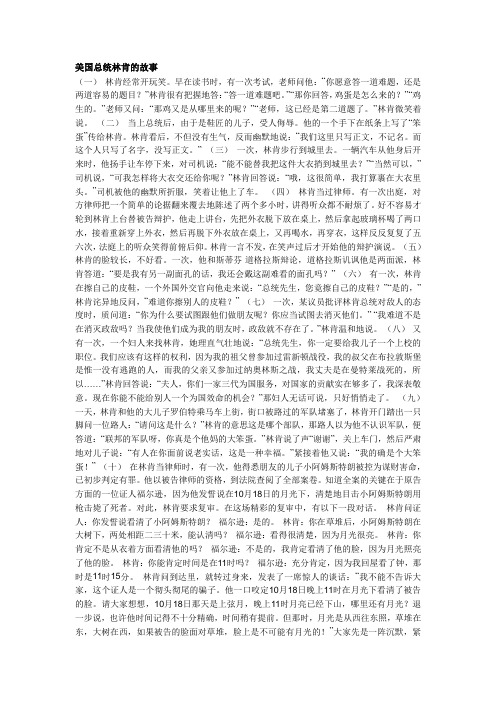
美国总统林肯的故事(一)林肯经常开玩笑。
早在读书时,有一次考试,老师问他:“你愿意答一道难题,还是两道容易的题目?”林肯很有把握地答:“答一道难题吧。
”“那你回答,鸡蛋是怎么来的?”“鸡生的。
”老师又问:“那鸡又是从哪里来的呢?”“老师,这已经是第二道题了。
”林肯微笑着说。
(二)当上总统后,由于是鞋匠的儿子,受人侮辱。
他的一个手下在纸条上写了“笨蛋”传给林肯。
林肯看后,不但没有生气,反而幽默地说:“我们这里只写正文,不记名。
而这个人只写了名字,没写正文。
”(三)一次,林肯步行到城里去。
一辆汽车从他身后开来时,他扬手让车停下来,对司机说:“能不能替我把这件大衣捎到城里去?”“当然可以,”司机说,“可我怎样将大衣交还给你呢?”林肯回答说:“哦,这很简单,我打算裹在大衣里头。
”司机被他的幽默所折服,笑着让他上了车。
(四)林肯当过律师。
有一次出庭,对方律师把一个简单的论据翻来覆去地陈述了两个多小时,讲得听众都不耐烦了。
好不容易才轮到林肯上台替被告辩护,他走上讲台,先把外衣脱下放在桌上,然后拿起玻璃杯喝了两口水,接着重新穿上外衣,然后再脱下外衣放在桌上,又再喝水,再穿衣,这样反反复复了五六次,法庭上的听众笑得前俯后仰。
林肯一言不发,在笑声过后才开始他的辩护演说。
(五)林肯的脸较长,不好看。
一次,他和斯蒂芬·道格拉斯辩论,道格拉斯讥讽他是两面派,林肯答道:“要是我有另一副面孔的话,我还会戴这副难看的面孔吗?”(六)有一次,林肯在擦自己的皮鞋,一个外国外交官向他走来说:“总统先生,您竟擦自己的皮鞋?”“是的,”林肯诧异地反问,“难道你擦别人的皮鞋?”(七)一次,某议员批评林肯总统对敌人的态度时,质问道:“你为什么要试图跟他们做朋友呢?你应当试图去消灭他们。
”“我难道不是在消灭政敌吗?当我使他们成为我的朋友时,政敌就不存在了。
”林肯温和地说。
(八)又有一次,一个妇人来找林肯,她理直气壮地说:“总统先生,你一定要给我儿子一个上校的职位。
林肯擦鞋.doc

林肯擦鞋明报加西版(温哥华)D20 | 人物‧通识| By 曾钰成2010-04-16文﹕曾钰成以解放黑奴而名垂史册的亚伯拉罕.林肯(Abraham Lincoln,1809-1865),是美国历任总统中最幽默的一位。
有很多关于林肯幽默感的故事流传于后世,以下是其中一则。
有一次,一位外国(有说是英国)的外交官到白宫访问,碰到林肯在擦皮鞋。
外交官大为惊讶,脱口而出问道:「What, Mr President, do you shine your own shoes?」林肯回答说:「Y es. Whose shoes do you shine?」这段对话翻译为中文时,一般是这样的:外交官:「总统先生,您自己擦皮鞋吗?」林肯:「是的。
你擦谁的皮鞋呢?」这翻译虽没有错,却失掉了原来的幽默。
试想想,对方问林肯是不是自己擦鞋,林肯则反问对方擦谁的鞋,这可有点答非所问;听起来彷佛客人的问题令林肯感到不高兴,于是反唇相讥。
如果就是这样,怎算得上幽默?其实这对答奥妙之处,在于shine your own shoes可有两个不同的解释:「擦自己的鞋」和「自己擦鞋」。
按字面含意,shine your own shoes本是「擦你自己(而不是别人)的鞋」。
可是,当人们要说「(你)自己擦鞋」(不是让别人替你擦)时,也会说「(you)shine your own shoes」,这正是那位外交官问题的含义。
然而林肯却故意采用了问题的字面解释,即「你擦自己的鞋吗?」于是顺理成章地回问一句「你擦谁的鞋呢?」这就是幽默。
「Cook your own meals: it's cheaper and healthier.」这句话里Cook your own meals的字面解释虽是「煮你自己的饭」(像是叫人不要为别人煮饭),但其实是叫人自己煮饭(不要到外边吃饭)。
如果改说Cook your meals yourself,也是「自己煮饭」,但含义略有不同,是叫你要自己动手,不要假手于人。
林肯总统的故事
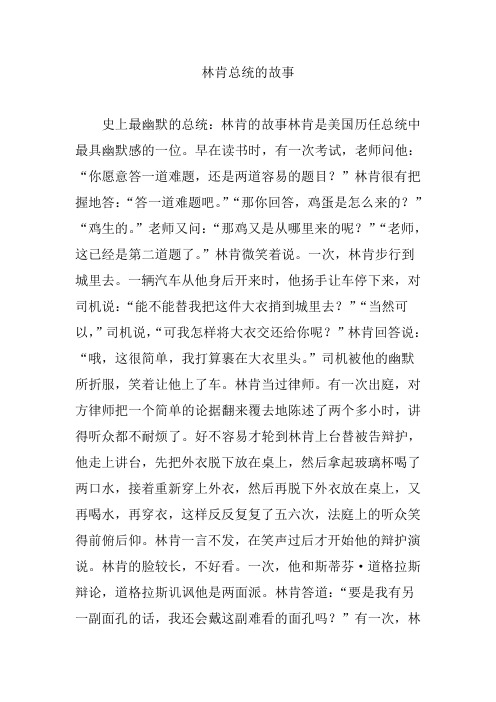
林肯总统的故事史上最幽默的总统:林肯的故事林肯是美国历任总统中最具幽默感的一位。
早在读书时,有一次考试,老师问他:“你愿意答一道难题,还是两道容易的题目?”林肯很有把握地答:“答一道难题吧。
”“那你回答,鸡蛋是怎么来的?”“鸡生的。
”老师又问:“那鸡又是从哪里来的呢?”“老师,这已经是第二道题了。
”林肯微笑着说。
一次,林肯步行到城里去。
一辆汽车从他身后开来时,他扬手让车停下来,对司机说:“能不能替我把这件大衣捎到城里去?”“当然可以,”司机说,“可我怎样将大衣交还给你呢?”林肯回答说:“哦,这很简单,我打算裹在大衣里头。
”司机被他的幽默所折服,笑着让他上了车。
林肯当过律师。
有一次出庭,对方律师把一个简单的论据翻来覆去地陈述了两个多小时,讲得听众都不耐烦了。
好不容易才轮到林肯上台替被告辩护,他走上讲台,先把外衣脱下放在桌上,然后拿起玻璃杯喝了两口水,接着重新穿上外衣,然后再脱下外衣放在桌上,又再喝水,再穿衣,这样反反复复了五六次,法庭上的听众笑得前俯后仰。
林肯一言不发,在笑声过后才开始他的辩护演说。
林肯的脸较长,不好看。
一次,他和斯蒂芬·道格拉斯辩论,道格拉斯讥讽他是两面派。
林肯答道:“要是我有另一副面孔的话,我还会戴这副难看的面孔吗?”有一次,林肯在擦自己的皮鞋,一个外国外交官向他走来说:“总统先生,您竟擦自己的皮鞋?”“是的,”林肯诧异地反问,“难道你擦别人的皮鞋?”有人认为林肯对待政敌的态度不够强硬,对他说:“你为什么要让他们成为朋友呢?你应该想办法消灭他们才对。
”“我难道不是在消灭政敌吗?当我使他们成为我的朋友时,政敌就不存在了。
”林肯温和地说。
又有一次,一个妇人来找林肯,她理直气壮地说:“总统先生,你一定要给我儿子一个上校的职位。
我们应该有这样的权利,因为我的祖父曾参加过雷新顿战役,我的叔父在布拉敦斯堡是惟一没有逃跑的人,而我的父亲又参加过纳奥林斯之战,我丈夫是在曼特莱战死的,所以……”林肯回答说:“夫人,你们一家三代为国服务,对国家的贡献实在够多了,我深表敬意。
林肯的幽默故事

林肯的幽默故事林肯是美国历史上备受尊敬和崇拜的一位总统,他的智慧和幽默常常使人们留下深刻的印象。
在他的领导下,美国迈向了一个更加繁荣和团结的未来。
然而,很少有人注意到,林肯除了是一位出色的政治家和领导者,他还是一位极具幽默感的人。
下面,我将分享一些林肯的幽默故事。
故事一:林肯的大脚丫有一次,林肯给一位来宾导游参观白宫。
导游注意到林肯的脚丫非常大,他好奇地问道:“总统先生,您的脚丫真大啊!这是您的天生尺码吗?”林肯非常幽默地回答道:“这是我一生中唯一能够遮住我全部身高的东西了。
”故事二:林肯的小人国有一次,林肯接待了一位州长。
州长看到林肯办公桌上放置了一张世界地图,他问道:“总统先生,您为什么把地图放得如此之小?”林肯回答道:“这是我刚刚接手总统职务时,要做的几件事情都在这个小小的地图上,所以我没有必要放得太大。
”故事三:林肯的裤子林肯因为身高而经常被称为“高个子林肯”,有一次,有人问他:“总统先生,您的裤子有多长?”林肯回答道:“够抵挡我将来的一生。
”这个幽默的回答展现了林肯的幽默感和自嘲。
故事四:林肯的奖赏林肯经常被人称为“林肯先生”,一天,有人提议给他颁发“林肯先生奖”。
林肯听后,笑着说道:“我会非常高兴接受这个奖项,但只有在您也同样能得到一个‘林肯先生’奖项的情况下。
”故事五:林肯的名言林肯在许多场合都发表过一些富有哲理的名言,其中一个著名的例子是:“如果我有两个脸,那么我用来笑的脸会在我生活的地方。
”这个名言充满了智慧和幽默,它展示了林肯对人生的积极态度。
这些幽默故事展现了林肯作为一位总统和领导者的智慧和幽默感。
他的幽默不仅仅是为了逗笑他人,更是为了与人建立亲近的联系,减轻紧张气氛,并以此来展现他亲和力和人格魅力。
因此,林肯的幽默故事成为了人们对他的记忆和敬仰的一部分。
总结:林肯的幽默故事给人们留下了深刻的印象。
他用幽默的方式与人沟通,展现了他特有的智慧和幽默感。
这些故事不仅仅是为了逗乐,更是林肯积极的态度和亲和力的体现。
介绍林肯的演讲稿

演讲稿也叫演讲词,它是在较为隆重的仪式上和某些公众场合发表的讲话文稿。
好的演讲稿,应该既有热情的鼓动,又有冷静的分析,要把抒情和说理有机地结合起来,做到动之以情,晓之以理。
语言要求做到准确、精练、生动形象、通俗易懂,不能讲假话、大话、空话,也不能讲过于抽象的话。
要多用比喻,多用口语化的语言,深入浅出,把抽象的道理具体化,把概念的东西形象化,让听众听得入耳、听得明白。
演讲稿具有宣传、鼓动、教育和欣赏等作用,它可以把演讲者的观点、主张与思想感情传达给听众以及读者,使他们信服并在思想感情上产生共鸣,下面一起来看下为大家精选的演讲稿。
伟大人物的伟业,好比夜间天上的一轮明月,使大地有了光明,下面就是给大家分享的介绍林肯的演讲稿,希望对大家有帮助。
介绍林肯的演讲稿篇一1820xx年2月12日,亚伯拉罕·林肯出生在一个农民的家庭。
小时候,家里很穷,他没机会上学,每天跟着父亲在荒原上劳动。
他自己说:“我一生中进学校的时候,加在一起总共不到一年。
”但林肯勤奋好学,一有机会就向别人请教。
他什么活儿都干,不管干什么,他都非常认真负责,诚实而且守信用。
他十几岁时当过村了里杂货店的店员。
有一次,一个顾客多付了几分钱,他为了退这几分钱跑了十几里路。
还有一次,他发现少给了顾客二两茶叶,就跑了几里路把茶叶送到那人家中。
他诚实、好学、谦虚,每到一处,都受到周围人的喜爱。
1836年,他通过考试当上了律师。
当律师以后,由于他精通法律,口才很好,在当地很有声望。
很多人都来找他帮着打官司。
但是他为了当事人辩护有一个条件,就是当事人必须是正义的一方。
许多穷人没有钱付给他劳务费,但是只要告诉林肯:“我是正义的,请你帮我讨回公道。
”林肯就会免费为他辩护。
一次,一个很有钱的人请林肯为他辩护。
林肯听了那个客户的陈述,发现那个人是在诬陷好人,于是就说:“很抱歉,我不能替您辩护,因为您的行为是非正义的。
”那个人说:“林肯先生,我就是想请您帮我打这场不正义的官司,只要我胜诉,您要多少酬劳都可以。
世界名人幽默故事
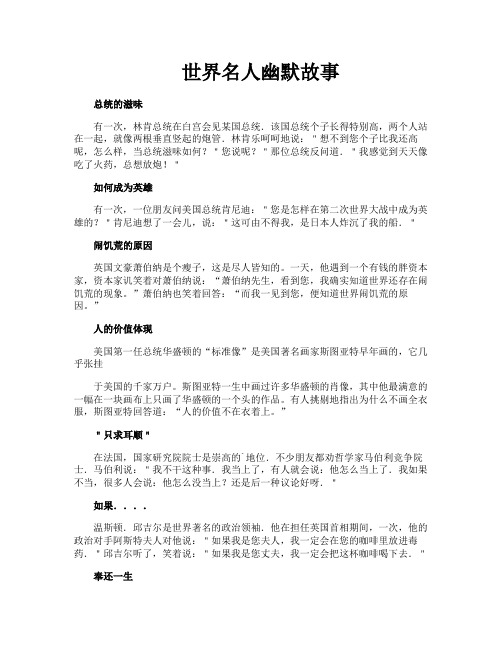
世界名人幽默故事总统的滋味有一次,林肯总统在白宫会见某国总统.该国总统个子长得特别高,两个人站在一起,就像两根垂直竖起的炮管.林肯乐呵呵地说:"想不到您个子比我还高呢,怎么样,当总统滋味如何?"您说呢?"那位总统反问道."我感觉到天天像吃了火药,总想放炮!"如何成为英雄有一次,一位朋友问美国总统肯尼迪:"您是怎样在第二次世界大战中成为英雄的?"肯尼迪想了一会儿,说:"这可由不得我,是日本人炸沉了我的船."闹饥荒的原因英国文豪萧伯纳是个瘦子,这是尽人皆知的。
一天,他遇到一个有钱的胖资本家,资本家讥笑着对萧伯纳说:“萧伯纳先生,看到您,我确实知道世界还存在闹饥荒的现象。
”萧伯纳也笑着回答:“而我一见到您,便知道世界闹饥荒的原因。
”人的价值体现美国第一任总统华盛顿的“标准像”是美国著名画家斯图亚特早年画的,它几乎张挂于美国的千家万户。
斯图亚特一生中画过许多华盛顿的肖像,其中他最满意的一幅在一块画布上只画了华盛顿的一个头的作品。
有人挑剔地指出为什么不画全衣服,斯图亚特回答道:“人的价值不在衣着上。
”"只求耳顺"在法国,国家研究院院士是崇高的`地位.不少朋友都劝哲学家马伯利竞争院士.马伯利说:"我不干这种事.我当上了,有人就会说:他怎么当上了.我如果不当,很多人会说:他怎么没当上?还是后一种议论好呀."如果....温斯顿.邱吉尔是世界著名的政治领袖.他在担任英国首相期间,一次,他的政治对手阿斯特夫人对他说:"如果我是您夫人,我一定会在您的咖啡里放进毒药."邱吉尔听了,笑着说:"如果我是您丈夫,我一定会把这杯咖啡喝下去."奉还一生医生为年青时的英国作家萨维奇治病.作家长期潦倒,健康状况极坏,好不容易才保住一条命.医生最后把一张医疗帐单送给他,告诉他:我救了你一条命,你应当有所报答."萨维奇送给医生一本书,恭敬地说:"我把命还给你."这本书名是:《萨维奇的一生》不入官场鲍勃·霍普在美国家喻户晓,因为他极善于用诙谐幽默的语言批评时弊,尤其是政府的错误.新一任总统上台后,决定请他出任要职.他讥笑着说--"假如我也去当官,谁还来批评当官的呢?"不知去何处古希腊寓言家伊索是个奴隶.一天,主人派他进城办货,半路上他遇见一个法官.法官盘问他:"你去哪儿?"伊索对贪赃枉法的法官向来不屑一顾,回答道:"不知道!""不知道?"法官表示怀疑,把伊索抓了起来,囚禁到监狱."说实话难道也犯法吗?"伊索在狱中抗议道,"我是不知道你们会把我投入监狱的呀!"法官只好把伊索放了.舞会偶遇普希金年轻的时候并不出名.有一次,他在彼得堡参加一个公爵家的舞会.他邀请一位年轻而漂亮的贵族小姐跳舞,这位小姐傲慢地看了普希金一眼,冷淡地说:"我不能和一个小孩子一起跳舞."普希金没有生气,微笑地说:"对不起!亲爱的小姐,我不知道您正怀着孩子."说完,他很有礼貌地鞠了一躬,然后离开舞厅.借力爱迪生在住所搞了不少实用发明。
- 1、下载文档前请自行甄别文档内容的完整性,平台不提供额外的编辑、内容补充、找答案等附加服务。
- 2、"仅部分预览"的文档,不可在线预览部分如存在完整性等问题,可反馈申请退款(可完整预览的文档不适用该条件!)。
- 3、如文档侵犯您的权益,请联系客服反馈,我们会尽快为您处理(人工客服工作时间:9:00-18:30)。
最幽默的美国总统--林肯
【名人故事】:最幽默的美国总统--林肯
林肯是美国历任总统中最具幽默感的一位。
早在读书时,有一次,老师问他:“你愿意答一道难题,还是两道容易的题目?”林肯很有把握地答:“答一道难题吧。
”“那你回答,鸡蛋是怎么来的?”“鸡生的。
”老师又问:“那鸡又是从哪里来的呢?”“老师,这已经是第二道题了。
”林肯微笑着说。
一次,林肯步行到城里去。
一辆汽车从他身后开来时,他扬手让车停下来,对司机说:“能不能替我把这件大衣捎到城里去?”“当然可以,”司机说,“可我怎样将大衣交还给你呢?”林肯回答说:“哦,这很简单,我打算裹在大衣里头。
”司机被他的幽默所折服,笑着让他上了车。
林肯当过律师。
有一次出庭,对方律师把一个简单的'论据翻来覆去地陈述了两个多小时,讲得听众都不耐烦了。
好不容易才轮到林肯上台替被告辩护,他走上讲台,先把外衣脱下放在桌上,然后拿起璃杯喝了两口水,接着重新穿上外衣,然后再脱下外衣放在桌上,又再喝水,再穿衣,这样反反复复了五六次,法庭上的听众笑得前俯后仰。
林肯一言不发,在笑声过后才开始他的辩护演说。
林肯的脸较长,不好看。
一次,他和斯蒂芬·道格拉斯辩论,道格拉斯讥讽他是两面派。
林肯答道:“要是我有另一副面孔的话,我还会戴这副难看的面孔吗?”
有一次,林肯在擦自己的皮鞋,一个外国外交官向他走来说:“总统先生,您竟擦自己的皮鞋?”“是的,”林肯诧异地反问,“难道你擦别人的皮鞋?”
有人认为林肯对待政敌的态度不够强硬,对他说:“你为什么要让他们成为朋友呢?你应该想办法消灭他们才对。
”“我难道不是在消灭政敌吗?当我使他们成为我的朋友时,政敌就不存在了。
”林肯温和地说。
又有一次,一个妇人来找林肯,她理直气壮地说:“总统先生,你一定要给我儿子一个上校的职位。
我们应该有这样的权利,因为我的祖父曾参加过雷新顿战役,我的叔父在布拉敦斯堡是惟一没有逃跑的人,而我的父亲又参加过纳奥林斯之战,我丈夫是在曼特莱战死的,所以……”林肯回答说:“夫人,你们一家三代为国服务,对国家的贡献实在够多了,我深表敬意。
现在你能不能给别人一个为国效命的机会?”那妇人无话可说,只好悄悄走了。
